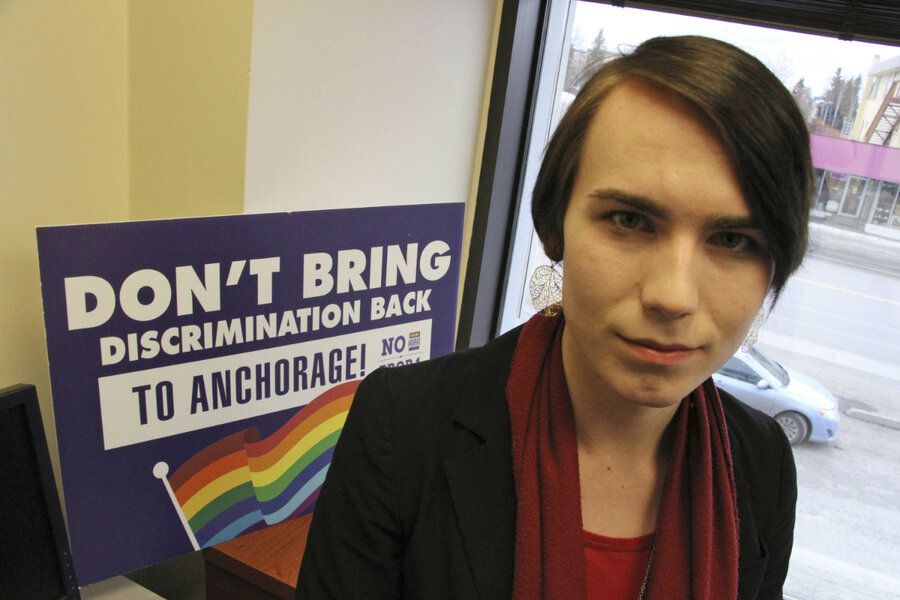Anchorage takes historic step toward challenging bathroom bills
Loading...
| Anchorage, Alaska
Voters in Alaska's largest city are on track to becoming the first in the United States to defeat a so-called bathroom bill in a referendum that asked them to require people to use public bathrooms and locker rooms consistent with their gender at birth.
The initiative asked Anchorage's voters to repeal an ordinance passed in 2015 that prevented discrimination based on sexual orientation and added a clause that would have prevented transgender people from using bathrooms and locker rooms corresponding to their gender identities.
Voting by mail and in person ended on April 3 and the repeal effort was losing 53 to 47 percent as of Monday, with nearly 78,000 votes counted and only several hundred to be counted when tallying ends on Friday. Supporters of the referendum have conceded defeat and opponents are claiming victory.
Among those celebrating was Lillian Lennon, who was 14 when her parents sent her from Alaska to Utah for residential therapy, where conversion therapy was practiced and the transgender teen was placed in a boy's dorm.
"I was forced to go by pronouns and a name I didn't identify with, and was regularly harassed and bullied for who I was and simply not being able to be known as myself," she said.
Ms. Lennon took the semester off from the University of Alaska Anchorage to campaign against the initiative, and said her parents spoke out against it.
"I wasn't able to live my life fully, and I absolutely would not want anyone under any circumstances to have to go through what I had to go through," Lennon said.
After the result's final tally emerges and it is certified next week, Anchorage will hold the distinction of being the first US voting jurisdiction to defeat such an effort in a stand-alone ballot measure, said Alex Morash, spokesman for the National LGBTQ Task Force Action Fund.
The issue of transgender bathroom access moved into the national spotlight in 2015, after the Houston City Council adopted a nondiscrimination ordinance that included protections for transgender people using restrooms based on gender identity.
Opponents of the ordinance gathered enough signatures for a repeal referendum, then mounted a campaign using the slogan "No Men in Women's Bathrooms." By a margin of 61 percent to 39 percent, the anti-bias ordinance was repealed.
In Massachusetts, voters will be asked in November whether they want to repeal a 2016 state law barring discrimination on the basis of gender identity in public accommodations, including allowing transgender people to use bathrooms and locker rooms that correspond to their gender identities.
The Anchorage proposition was filed by Jim and Kim Minnery and their group, Alaska Family Action.
While conceding defeat, Jim Minnery said "we're encouraged that 47 percent of the people in Anchorage didn't buy into the $1 million infusion that the outside LGBT activist groups poured into the city."
Groups opposed to his effort reported receiving about $826,000 in donations while Mr. Minnery's campaign effort, Yes on 1 Protect Our Privacy, raised nearly $140,000.
With Alaska's economy emerging from a recession, influential city groups were wary about a possible economic backlash if the repeal was successful.
That happened in North Carolina in 2016 after state lawmakers passed a bathroom bill and the NCAA and NBA pulled games from the state. An Associated Press analysis conducted before lawmakers rolled back the restrictions found the law would cost the state more than $3.76 billion in lost business over a dozen years.
In Alaska, those against the bathroom bill included oil company BP, the Wells Fargo Bank, and Visit Anchorage, which represents the city's tourism industry.
"The experience of North Carolina seems to be a pretty good case study on the national reaction, kind of significant and fairly united national reaction to this kind of ordinance or law or proposition," said John Kauffman, an Anchorage lawyer who campaigned against the measure.
Anchorage is much more isolated than North Carolina and the bathroom measure could have hurt the city, he said.
"Just from a purely economic standpoint, it seems like a really bad idea," Mr. Kauffman said of the proposition.
The LGBT community has seen a series of wins over the years, from more lenient policies allowing gays to openly serve in the military to legalized same-sex marriage. Most were focused on the lesbian, gay, and bisexual part of the acronym, said Jeremy Goldbach, an associate professor of social work at the University of Southern California who specializes in LGBT issues.
There has been criticism from the transgender community that the "T'' gets left off, he said.
"I think that has given room and rise to these bills like in North Carolina and these proposals trying to come out of Alaska," he said.
This story was reported by The Associated Press.







